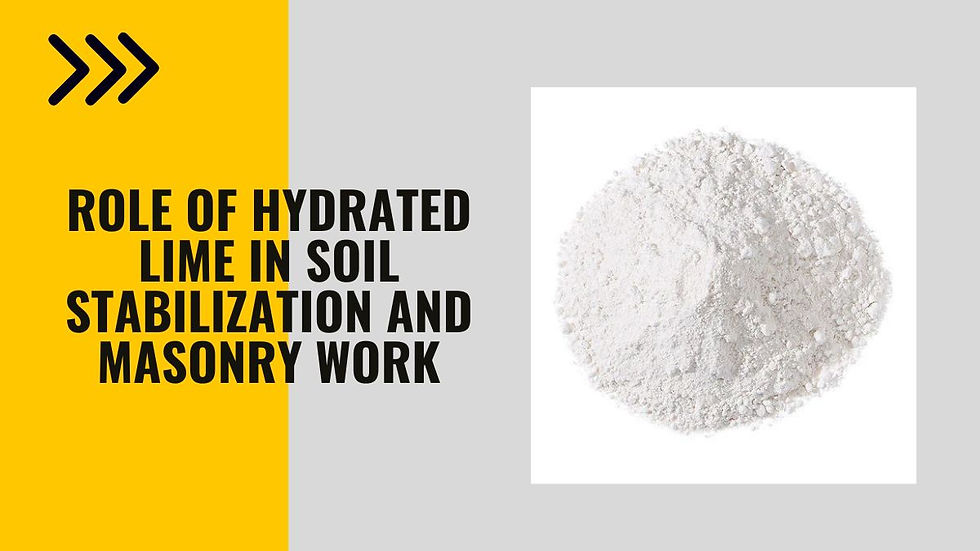Role of Hydrated Lime in Soil Stabilization and Masonry Work
- Shaurya Minerals
- May 10, 2025
- 3 min read
Hydrated lime, also known as calcium hydroxide (Ca(OH)₂), is a versatile chemical compound that plays a vital role in various industries, especially in construction and soil improvement. As modern engineering and building practices advance, the demand for high-quality hydrated lime powder continues to grow, making the expertise of a reliable hydrated lime manufacturer more essential than ever. In this blog, we will explore how hydrated lime contributes significantly to soil stabilization and masonry work, providing strength, durability, and long-lasting benefits.

What is Hydrated Lime?
Hydrated lime is produced by adding water to quicklime (calcium oxide), resulting in a fine, dry powder of calcium hydroxide. This white powder is widely used in various sectors including agriculture, water treatment, chemical manufacturing, and, most notably, the construction industry.
Its alkaline nature and reactivity make it especially valuable in construction-related applications. Whether it's improving soil quality for road building or enhancing mortar strength in masonry structures, hydrated lime serves as a key component for durable and sustainable outcomes.
Hydrated Lime in Soil Stabilization
Soil stabilization is the process of enhancing the physical properties of soil to make it more suitable for construction. In regions with clay-rich or expansive soils, this step becomes essential to ensure long-term performance and minimize foundation problems.
How Hydrated Lime Works in Soil Stabilization:
Chemical Reaction: When hydrated lime powder is mixed with clay soil, it initiates a chemical reaction known as cation exchange. This reaction alters the soil particles' structure, reducing plasticity and increasing workability.
Pozzolanic Reaction: Over time, a secondary reaction occurs between the lime and the silica/alumina present in the soil. This pozzolanic reaction creates cementitious compounds that greatly improve the strength and durability of the soil.
Moisture Reduction: Hydrated lime also helps to reduce soil moisture content, which is crucial when dealing with wet or waterlogged areas. This makes it easier to compact and shape the soil during construction.
Benefits of Using Hydrated Lime in Soil Stabilization:
Increased load-bearing capacity
Reduced plasticity index
Improved resistance to water and erosion
Enhanced long-term durability of roads and foundations
For large infrastructure projects such as highways, airports, and industrial facilities, partnering with a reliable hydrated lime manufacturer ensures consistent quality and performance.
Hydrated Lime in Masonry Work
Masonry work has been a cornerstone of construction for centuries, and hydrated lime continues to be a critical ingredient in traditional and modern mortar formulations.
Role of Hydrated Lime in Mortar:
Plasticity and Workability: Hydrated lime improves the plasticity of mortar, making it easier for masons to apply and shape. This leads to better bonding between bricks or stones.
Water Retention: Lime mortars retain moisture longer, allowing for adequate curing. This enhances the mortar's adhesion and reduces the risk of cracking.
Flexibility and Breathability: Lime-based mortars are more flexible and breathable compared to cement-only mixes. This is especially important in historical restoration work, where allowing moisture to escape helps preserve the structural integrity of older buildings.
Self-Healing Properties: Lime mortars exhibit autogenous healing—small cracks can reseal over time due to carbonation, where lime reacts with atmospheric CO₂ to form calcium carbonate.
Advantages in Masonry Applications:
Enhanced bond strength
Increased resistance to weathering
Better compatibility with historic materials
Eco-friendly and sustainable building option
Using high-purity hydrated lime powder from a trusted hydrated lime manufacturer ensures the mortar performs optimally across various environmental conditions.
Choosing the Right Hydrated Lime Manufacturer
When it comes to construction and soil treatment, the quality of hydrated lime can significantly impact results. Always look for a hydrated lime manufacturer who:
Adheres to strict quality control standards
Offers consistent particle size and purity
Provides technical support for industrial applications
Ensures timely and efficient delivery
By sourcing premium-grade hydrated lime powder, you guarantee reliable performance in both soil stabilization and masonry applications.
Conclusion
Hydrated lime is more than just a chemical compound—it's a foundation for strength, stability, and sustainability in construction. From improving soil integrity in large-scale infrastructure to enhancing the performance of masonry mortar, hydrated lime proves its value time and again. As demand for resilient and eco-friendly construction materials grows, so too does the importance of selecting the right hydrated lime supplier. By understanding its applications and benefits, engineers, builders, and architects can make informed decisions that lead to safer, stronger, and more enduring structures.




Comments